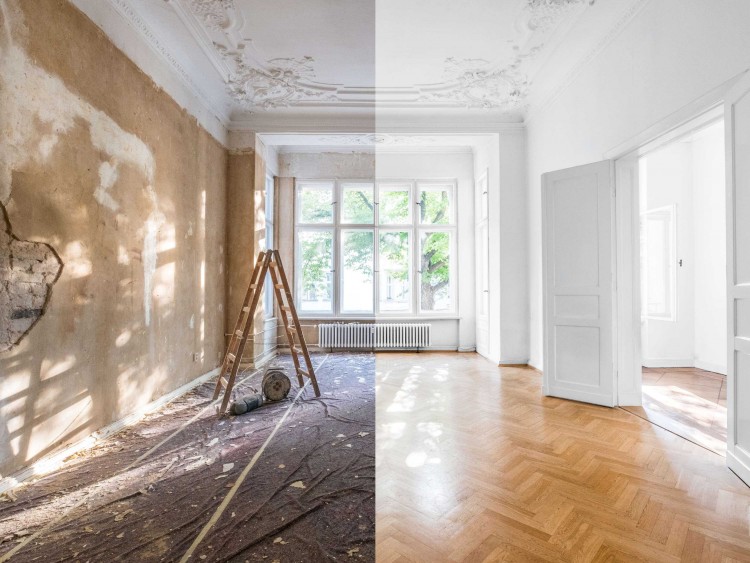
Buying your own home is an exciting (and expensive!) undertaking, however if you want your budget to go further and you don’t mind taking on a renovation project, a ‘doer upper’ can prove to be a shrewd investment. But beware, purchasing and fixing up a property is not for the faint hearted…
Before you commit your hard-earned cash to a building that needs a fair amount of work, it is highly recommended that you carry out a thorough risk assessment, both in terms of the building itself and your ability and readiness to take it on such a large project. Without taking stock of your financial position and the structural condition of the property, it’s difficult to develop a realistic idea of what you’re getting yourself into, with potentially serious consequences. Here are the main questions you should be asking.
1. What’s the budget?
Whether you are acquiring a building, developing a building or both, it all starts and ends with the budget. Work out a realistic amount you can afford to spend on the property overall, then allocate one part of the budget to the purchase. You should be able to negotiate a favourable purchase price in view of the fact that the building is in need of renovation. Set another part to the budget aside for renovation works. Depending on the property, you may wish to put in a new kitchen or bathroom or add value with a loft conversion. Whatever your plans are, it’s wise to add another 20% contingency to the budget just in case of unforeseen problems.
2. What can you do yourself?
A great way to make your budget go further is to use your own skills rather than having to pay someone else. However, think carefully about the jobs you are able to do yourself – stripping wallpaper and painting walls is one thing, plumbing in a toilet or building kitchen cabinets is quite another. While enthusiasm is a commendable quality and much can be achieved with a can-do attitude and a little help from YouTube video tutorials, it is equally important to accept your own limitations. For your own safety and peace of mind, some building jobs should always be left to the professionals. This includes roofing and structural building works, electrics & plumbing.
3. Do you need planning permission?
If you are thinking of making extensive structural alterations to the house, you may well need planning permission. Luckily, many smaller renovation projects don’t require planning consent as they fall under permitted development rights but do always check in advance. Certainly, if the building is situated in a Conservation Area or has designated listed status, the local authority must grant consent before you carry out any works. And if your doer-upper is a leasehold flat, the lease will state whether alterations are permissible and whether you will need written permission from the freeholder in order to proceed. Find out how easy it will be to get planning permission for your renovation plans, and build in at least 12 weeks into your schedule for the council to make a decision.
4. Who will project manage the build?
The bigger the project, the more project management it will require. You can either manage this yourself or employ a project manager. This could be your lead contractor or architect whose job it will be to liaise with builders to ensure the build is carried out to spec, to budget and within the timeframe. If you don’t have the budget to pay for the extra resource, you could manage your own project. This means dealing with tradesmen direct, getting quotes in to calculate your expenditure, supervising the work and carrying out quality control, and generally making sure the project stays on track. Usually, it also means living on a building site until the work is complete.
5. How old is the building?
Period properties may have a special charm all their own but they often also have hidden issues that can be expensive to fix, especially if you need to employ specialist tradesmen who know the right construction techniques and materials to use for older buildings. Make sure that you are indeed buying a hidden treasure, not a money pit, and allow a larger proportion of your budget for unexpected costs. Old electrics and plumbing, leaky roofs, damp and subsidence are just some of the issues that could eat into your renovation budget. Make sure you have a full structural building survey carried out before you buy, so you know the condition of the property and can budget accordingly.
6. How much time have you got?
Renovating a fixer-upper may start off as an exciting adventure but the process can be lengthy and stressful. Can you imagine still living on a building site in 5 years’ time? Before you commit to doing up a property, work out a realistic timeframe, based on advice from tradesmen who know how long things can take, then add on a buffer for contingency planning. Also, remember that, fixer-upper or not, life goes on, so factor in some holiday time to give yourself a breather and flex your timescale to allow for other commitments you may have. If you have a full-time job or small children, for instance, and you are planning to DIY much of the project, it is bound to take longer.











Author
Homesgofast com
Homesgofast.com is an international real estate portal and news source for Google news. Publishing international real estate, finance, homes and travel-related news and blogs for a targeted audience since 2002. Each news item is circulated to thousands of potential readers each day and is also available to the millions of people who sign up for Google news alerts. Find homes offered for sale and to rent direct from owners and some of the best real estate agents from over 35 countries